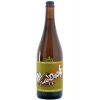Brasserie Dunham - Pale Duck
-
ABV:
7.5% -
Bottle Size:
750-ml -
Serving Temperature:
48–55° F -
Suggested Glassware:
Tulip, Chalice, or Chardonnay Glass
We’ve been putting the pieces together on this exclusive release from Brasserie Dunham for a while now. The initial plan was to aim for a 750mL bottling of Leo’s Early Breakfast IPA, a classic IPA with guava and Earl Grey tea. Instead, Dunham suggested a wholly new venture into the world of tea and hoppy beer—and as a result we’re able to offer our Rare Beer Club members Brasserie Dunham’s Pale Duck as an exclusive offering this month. It’s a delicious multigrain saison made with a rare oolong tea, and dry-hopped with Idaho7 hops. And it will only be available through The Rare Beer Club and Brasserie Dunham’s tasting room in Québec.
The base of Pale Duck is a multigrain saison brewed with rye, wheat, brown rice and oats, its bitterness kept to a modest 30 IBUs, with aroma additions of Chinook and Ekuanot hops. A dry-hop addition of Idaho7 follows—along with a very special addition of Ya Shi Xiang Dan Cong oolong tea that’s added after fermentation. Eloi Deit and the team at Dunham tested a variety of about 20 different teas for this beer, predominantly in the oolong category, before deciding on a rare Dan Cong varietal grown in and around Ping Keng Tou village in China’s Guangdong Province. The curious tea comes from 50- to 150-year-old bushes and trees, and importer Yunnan Sourcing provided some background information about its curious name.
Regarding Ya Shi Xiang (aka “duck shit aroma”) tea: “In the Ping Keng Tou village area, the soil has a somewhat yellow-brown look to it and is unique to that area. With all teas, the soil type is a key element in the tea's taste. Villagers wanting to guard the uniqueness of their tea bushes told outsiders the color and uniqueness of the soil in their village was due to copious amounts of duck shit and began to call their Dan Cong ‘duck shit aroma.’ True or not, it’s an entertaining story which reveals why the tea has such a gross name.” The resulting tea proves to be something else entirely—delicate, soothing, with complex floral and honey aromatics.
The bright saison characteristics of this beer land first, with vibrant core fruitiness, the spicy phenolics of the fermenting yeast, and really nice floral qualities from both the yeast and the tea addition. The robust, rustic characteristics of the rye and wheat here also show through early on. Bold show of fruit and floral combos throughout. The flavor opens things up far further, introducing juicier notes of mango and a pulpiness like soursop/guyabano fruit, as a warming component of vanilla smooths everything out. There’s a good bit of herbal, earthy bitterness coming through from the Chinook and Ekuanot additions, and we found that it worked great with the dry-hop Idaho7 and tea additions—creating an earthy, deeply floral, and engagingly grassy aspect that’s perfect for a saison framework. A heightened emphasis on the fruit and floral combo throughout makes for a very memorable saison experience.
Brasserie Dunham’s Pale Duck is bottle-conditioned and a healthy 7.5% ABV, such that it’s for sure sturdy enough for some cellaring time, but we fully expect those dry-hop and subtle tea components in this to fade reasonably quickly. Likely best enjoyed fresh. For pairings: a natural complement to the fruity and herbal aspects here would be roast chicken or duck.
Brasserie Dunham was founded in June of 2011, and they’ve been making a major impact on the world beer scene ever since. One of the first times we crossed paths was sampling their Assemblage No. 1 a few years back—a memorable blend of a saison/witbier hybrid and an American-style pale ale, with Brettanomyces and Zinfandel barrels for good measure. Some of our Rare Beer Club members may recall Dunham’s tasty Saison du Pinacle from a couple years ago. We’ve really been looking forward to bringing these folks back to the club.
While inspired by the European classics, the team at Brasserie Dunham has also found a lot of inspiration in their hometown of Dunham and the surroundings. The brewery works with local farmers to source ingredients, especially seasonal produce like raspberries, cherries and black currants for their fruited beers. Their restaurant also has them working with local farmers, and their barrel-aging project has grown to hundreds of barrels (with some foeders tossed in). They’re constantly tweaking the yeast blends for their wild beers and saisons, including testing out spontaneous fermentation and cultivating wild strains from the local air.
A recent RateBeer Best competition named Brasserie Dunham the top brewery in Québec, along with awarding medals to their grisette Ping Pong Wizard (a collaboration with Cambridge Brewing Co.) and their Rye ESB. In that same competition, Brasserie Dunham was named the top brewery in all of Canada as well as one of the top 100 breweries in the world overall (being included on that list for the fourth straight year). We’ve dug everything we’ve crossed so far from Brasserie Dunham—so we think it’s well deserved!
Brasserie Dunham currently self-distributes to points of sale across Québec, with a small amount getting shipped to other Canadian provinces and internationally, including the U.S., Belgium, France and Germany. Most of their production, though, gets consumed within Québec (and most of the Brasserie Dunham beer making it into the U.S. comes in kegs).
For those who enjoy Pale Duck as much as we do, you might also want to check out one of the major beer events Brasserie Dunham throws each year (which often see them releasing around a dozen barrel-aged beers at once). For more info on the brewery, upcoming events and more, check out www.brasseriedunham.com.

Unmatched Variety by style, brewery & country
Choose from Five different Beer Clubs offering unmatched variety by brewery,
country of origin, and beer style to suit your specific tastes.


